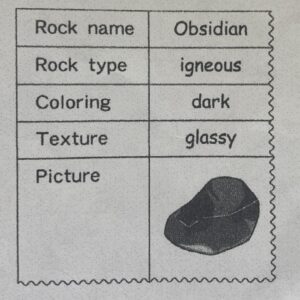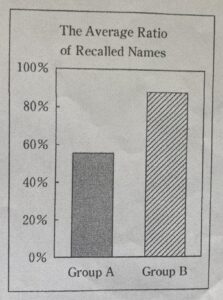今回から、先日2023年に実施された大学入学共通テストでの
英語の問題を扱って行きます。
基本的な問題の扱い方
今回、このブログでは、
共通テスト(英語)の「リーディング」の問題だけを扱うこととします。
基本的な問題の扱い方は、下記の通りにします。
①問題の提示
※基本的には「大問」毎に扱う予定ですが、問題の量などによりそれより細かく区切って取り扱うこともあります。
②模範解答の提示
③解説
④そのほかの補説
今回は第4問の解説です。
第4問:配点16
※各大問の英文や図表を読み、解答番号【 1 】〜【 49 】にあてはまるものとして
最も適当な選択肢を選びなさい。
Your teacher has asked you to read two articles about effective ways to study.
You will discuss what you learned in your next class.
Science Teacher, Stone City Junior High School
who struggle to learn. Recently, I found that their main way of learning was
to study new information repeatedly until they could recall it all. For example,
when they studied for a test, they would use a workbook like the example
below and repeatedly say the terms that go in the blanks: “Obsidian is igneous,
dark, and glassy. Obsidian is igneous, dark, and glassy …” These students
would feel as if they had learned the information, but would quickly forget it
and get low scores on the test. Also, this sort of repetitive learning is dull and
demotivating.
learning, new knowledge is constructed through students’ own experiences.
For my science class, students learned the properties of different kinds of
rocks. Rather than having them memorize the terms from a workbook. I
brought a big box of various rocks to the class. Students examined the rocks
and identified their names based on the characteristic they observed.
describe the properties of the rocks they studied. One issue, however, is that
we don’t always have the time to do contextual learning, so students will
still study by doing drills. I don’t think this is the best way. I’m still searching
for ways to improve their learning.

Professor, Stone City University
it can be beneficial. Repetition, though, can also work well. However, the
repetitive learning strategy he discussed, which is called “massed learning,” is
not effective. There is another kind of repetitive learning called “spaced
learning,” in which students memorize new information and then review it over
longer intervals.
The interval between studying is the key difference. In Mr. Oxford’s
example, his students probably used their workbooks to study over a short
period of time. In this case, they might have paid less attention to the content
as they continued to review it. The reason for this is that the content was no
longer new and could easily be ignored. In contrast, when the intervals are
longer, the students’ memory of the content is weaker. Therefore, they pay
more attention because they have to make a greater effort to recall what they
had learned before. For example, if students study with their workbooks, wait
three days, and then study again, they are likely to learn the material better.
Previous research has provided evidence for the advantages of spaced
learning. In one experiment, students in Groups A and B tried to memorize the
names of 50 animals. Both groups studied four times, but Group A studied
at one-day intervals while Group B studied at one-week intervals. As the figure
to the right shows, 28 days after the last learning session, the average ratio
of recalled names on a test was higher for the spaced learning group.
I understand that students often need to learn a lot of information in a
short period of time, and long intervals between studying might not be
practical. You should understand, though, that massed learning might not
be good for long-term recall.

問1 Oxford believes that 【 24 】.
① continuous drilling is boring
② reading an explanation of terms is helpful
③ students are not interested in science
④ studying with a workbook leads to success
問2 In the study discussed by Lee, students took a test【 25 】after their
final session.
① four weeks
② immediately
③ one day
④ one week
問3 Lee introduces spaced learning, which involves studying at 【 26 】
intervals, in order to overcome the disadvantages of 【 27 】learning
that Oxford discussed.
(Choose the best one for each box from options ①〜⑥.)
① contextual
② extended
③ fixed
④ irregular
⑤ massed
⑥ practical
問4 Both writers agree that 【 28 】is helpful for remembering new
information.
① experiential learning
② having proper rest
③ long-term attention
④ studying with workbooks
問5 Which additional information would be the best to further support Lee’s
argument for spaced learning?【 29 】
① The main factor that makes a science class attractive
② The most effective length of intervals for spaced learning
③ Whether students’ workbooks include visuals or not
④ Why Oxford’s students could not memorize information well
👉模範解答と解説は次のページです。



コメント